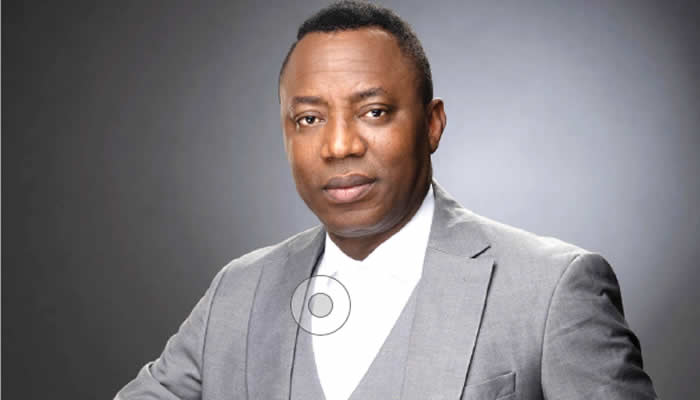By Ismaeel Aleem
Prominent activist and former presidential candidate of the African Action Congress, AAC, Omoyele Sowore, has defiantly rejected a letter from the Department of State Services (DSS) demanding the deletion of his social media posts criticising President Bola Tinubu.
In a strongly worded response addressed to the DSS Director General Oluwatosin Ajayi, Sowore accused the agency of unlawful overreach and acting as a proxy for the president, vowing to continue his advocacy for accountability.
The DSS letter, delivered discreetly to Sowore’s attorneys’ office and addressed to Abubakar Marshal, labelled Sowore’s tweets and Facebook posts as “criminal, false, and malicious.”
READ ALSO: SERAP urges Tinubu to withdraw DSS threat against X over Sowore’s tweet
Sowore, however, dismissed the demand as “insidious” and “fundamentally defective,” arguing that the DSS has no legal standing to represent Tinubu in defamation matters.
He emphasised that defamation is a personal tort, citing a 2021 court ruling in a related case where Justice Obiora Egwuatu awarded minimal damages against a proxy group suing on behalf of then-Attorney General Abubakar Malami, affirming that only the allegedly defamed individual can sue.
Sowore’s response detailed a decades-long history of alleged harassment by the DSS and its predecessors.
He recounted his 1993 abduction as a student leader at the University of Lagos during a pro-democracy protest, where he was detained for weeks without charges at the notorious Inter-Centre near Ikoyi Cemetery.
In 1996, during his National Youth Service Corps in Yola, Adamawa State, DSS agents detained and chained him at a Nigerian Air Force base, resulting in the denial of his NYSC discharge certificate to date.
More recently, in August 2019, Sowore was abducted from a hotel room, held for months on trumped-up charges of treasonable felony, money laundering, and cybercrime allegations he linked to his criticism of then-President Muhammadu Buhari.
He accused the DSS of flouting court orders, including invading a Federal High Court under Justice Ijeoma Ojukwu to re-arrest him despite meeting bail conditions and refusing to return confiscated properties or pay damages as ordered.
Drawing on constitutional protections, Sowore invoked Section 22 of the 1999 Constitution, which mandates the press to ensure government accountability, and Section 39, guaranteeing freedom of expression.
He referenced Article 9 of the African Charter on Human and Peoples’ Rights, UN General Comment No. 34, and landmark rulings like Arthur Nwankwo v. State (1985), which struck down sedition laws as unconstitutional.
Sowore argued that criticism is essential to democracy, quoting Justice Olatawura: citizens must defend free speech, and public officials should tolerate discomfort.
Sowore portrayed the DSS as a tool of oppression since its origins in the 1948 “E” Department, evolving through the National Security Organisation (NSO) and dissolved by Decree No. 19 in 1986 into the SSS, NIA, and DIA.
He warned that the agency’s “bullish” actions under successive regimes erode institutions while propping up “strong men,” many of whom have since fallen.
READ ALSO: Court orders six banks to reveal Sowore’s account details
Pledging unwavering commitment, Sowore stated, “You have no business telling me how to criticise the president.”
He affirmed the Nigerian people’s resolve to “reclaim their country from thieves in power,” ending with: “Aluta continua, victoria ascerta” (The struggle continues, victory is certain).



